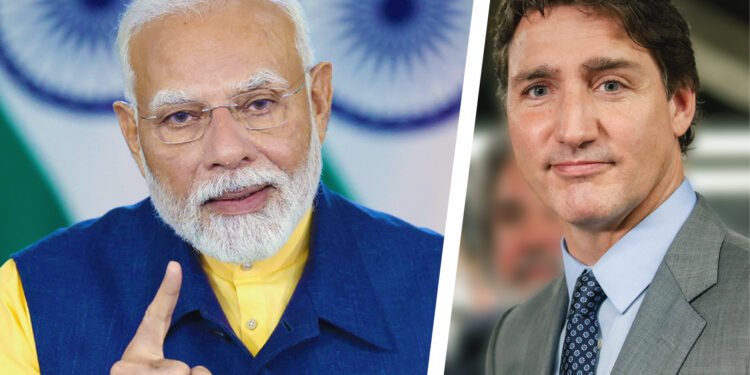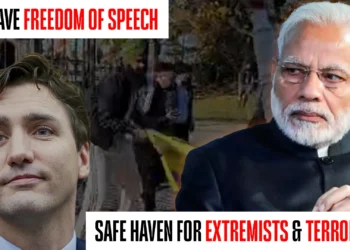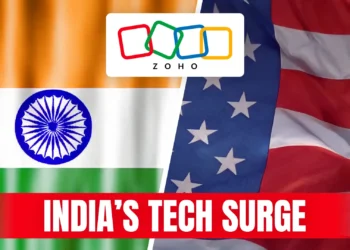India Canada Tensions have taken center stage as Prime Minister Justin Trudeau’s government pushes a narrative of bold action against India, accusing its diplomats of involvement in the murder of Canadian citizen Hardeep Nijjar—an individual declared a terrorist by India for his role in separatist activities. Yet, as the dust settles, the facts paint a different picture. India recalled its diplomats due to safety concerns, as confirmed by External Affairs Minister Dr. S. Jaishankar, making it clear that this was a preemptive move in response to the increasingly hostile environment in Canada. While Trudeau’s government appears determined to shape the story in its favor, the truth is far more complex.
Table of Contents
Diplomatic tensions between Canada and India have taken center stage as Prime Minister Justin Trudeau’s government accuses India of involvement in the killing of Canadian citizen Hardeep Nijjar—a figure declared a terrorist by India due to his role in separatist activities. However, the situation took a turn when India, concerned about the safety of its diplomats, made the strategic decision to recall its officials, including the High Commissioner. Despite Trudeau’s attempts to craft a different narrative, the reality is much more nuanced than the headlines suggest.
While Canadian media outlets and officials have been quick to claim that Canada expelled an Indian diplomat over controversial claims, the reality is quite different. India recalled its diplomats, including the High Commissioner, due to safety concerns and a loss of trust in the Canadian government, as confirmed by India’s External Affairs Minister, Dr. S. Jaishankar. Yet, Canada is pushing a narrative that it took decisive action. The question is: who’s really writing the script here?
India’s Recall: A Sensible Move, Not Canada’s Power Play
The reality of the India Canada Tensions becomes clearer when looking at how India recalled its diplomats, a strategic decision driven by safety concerns. Let’s start with the facts. While Canada tried to spin the story as if they had “expelled” an Indian diplomat over allegations of involvement in the murder of Canadian citizen Hardeep Nijjar, who was declared a terrorist by India due to his involvement with separatist movements (often referred to as Khalistani extremists), the truth is quite the opposite. India recalled its diplomats, including its High Commissioner, as confirmed by India’s External Affairs Minister, Dr. S. Jaishankar, due to the increasingly hostile environment in Canada. In his own words, the Indian government took the step because “we had concerns about the safety of our diplomats,” making it clear that this was a preemptive and protective move.
Watch Dr. S. Jaishankar’s statement on recalling diplomats here during his interview at NDTV World Summit 2024: THE INDIA CENTURY event.
But wait, didn’t Canada expel someone? Technically, yes. However, the real diplomatic move here was India’s decision to send home Canadian diplomats in response to Trudeau’s unfounded allegations. It’s a classic case of overplaying a hand: Canada tried to look like it was in control when, in reality, India was making the strategic decisions.
Canada’s Spin: Writing a Tale Without the Facts
Canada’s media and government officials worked hard to push a particular narrative: one where India was guilty by assumption. But, as the Indian High Commissioner pointed out in a now-well-known interview on CTV Question Period, India had been asking Canada for evidence for over a year, and none had been shared.
Watch the full interview here to see how the Canadian media worked hard to justify Trudeau’s narrative:
In the interview, the CTV reporter almost seemed to be on a mission to make the story stick, constantly asking why India wasn’t cooperating more. The High Commissioner, however, maintained that without evidence, there was little to discuss.
Despite the reporter’s best efforts, the lack of credible proof became obvious. It’s one thing to push a narrative; it’s another to do so without the facts.
Trudeau’s Admission: “No Hard Evidence” But Plenty of Drama
The most ironic twist? Justin Trudeau himself admitted that there’s no “hard evidence” linking India to the murder of Canadian terrorist Hardeep Nijjar. Yes, this entire diplomatic drama, which caused a rift between two significant nations, was based on intelligence, not actual proof.
Watch Trudeau’s own admission about the lack of evidence here:
Despite this, the Canadian government has continued to push the narrative, trying to build a case on a foundation that seems increasingly shaky. No hard evidence means there’s little to stand on, yet Trudeau’s administration has continued to play up the international tensions as though Canada had a clear case against India.
Meanwhile, Back in Canada: The Real Impact on Citizens
While Trudeau was focused on the diplomatic drama, ordinary Canadians continued to face the consequences of his leadership at home. Canada’s economic challenges haven’t disappeared. Inflation is still rising, making it harder for families to afford basic necessities, and housing remains unaffordable for many.
Canada’s public healthcare system, once a source of national pride, is struggling under the weight of long wait times and underfunding. In short, while Trudeau is busy pointing fingers abroad, Canadians are still paying the price for his domestic mismanagement.
To understand more about how Trudeau’s policies have impacted the Canadian economy, check out this analysis:
What’s Trudeau Really After? Political Survival
Let’s be real—this diplomatic row isn’t just about Nijjar or India. Trudeau is playing a political game, one that helps him distract from his government’s failures at home. By pointing fingers at India, Trudeau deflects attention from issues like Canada’s rising debt, its housing crisis, and the public’s growing discontent.
There’s also the matter of politics. Trudeau’s approach seems carefully calculated to court specific voter blocs, including those sympathetic to Canadian terrorists like Nijjar. By focusing on this international incident, Trudeau plays up his image as a defender of democracy and human rights—without addressing the very real issues affecting Canadians every day.
However, there’s a cost to these tactics. By souring relations with India—one of the world’s largest and fastest-growing economies—Canada risks losing important trade opportunities and long-term partnerships. For all the short-term political gains, Trudeau’s strategy might leave Canada worse off in the global economic landscape.
Looking Ahead: Trudeau’s Diplomatic Drama is Falling Apart
As the India Canada Tensions unfold, it’s becoming evident that Canada’s narrative is weakening in the face of a lack of hard evidence. As the days go by, Canada’s narrative seems to be unraveling. India recalled its diplomats for their safety, as confirmed by Dr. S. Jaishankar, and the so-called expulsion from Canada doesn’t hold much weight without hard evidence. Trudeau’s accusations, lacking in solid proof, are starting to look like political theater. And while he plays these diplomatic games, Canadians are still struggling with rising costs, a broken healthcare system, and a housing crisis.
In the end, this isn’t just about international relations—it’s about Trudeau trying to shift attention away from his own domestic troubles. Amid plummeting approval ratings and growing discontent from Canadians, Trudeau’s political maneuvering appears more about survival than diplomacy. And as the world watches this diplomatic drama unfold, it’s the ordinary Canadians who are paying the price for his political strategy.
As the diplomatic drama between India and Canada unfolds, it’s clear that while Trudeau attempts to push his narrative, India’s strategic decisions under Modi’s leadership reveal a more calculated and firm response. The ongoing tensions highlight deeper issues at play, leaving Canada’s international credibility—and its citizens—caught in the balance.
Key Questions on India-Canada Diplomatic Dispute
What is the issue between India and Canada?
The issue stems from recent diplomatic tensions, with Canada accusing India of involvement in a domestic incident, but these accusations were made without any hard evidence. India has since recalled its diplomats due to security concerns, highlighting deeper political and extremist challenges within Canada.
Is Canada worth going from India?
Given the rising safety concerns, economic struggles, and political instability in Canada, it may not be as attractive as before. India’s growing opportunities make staying and contributing to the local economy a better option for many.
What is the economic relationship between India and Canada?
India and Canada share trade relations, but recent diplomatic tensions have strained these ties. While both nations have potential for collaboration, current relations are under stress, particularly with trade and investment flow slowing down.
Which country is more powerful, Canada or India?
India is more powerful both economically and militarily. As the world’s largest democracy with a rapidly growing economy, India holds greater global influence compared to Canada, especially in terms of population, military strength, and strategic alliances.














